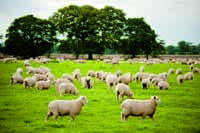Pasture management saves costs

Bagged nitrogen may be a necessary product for most grassland farmers, but for brothers Dafydd and John Parry Jones, artificial nitrogen has never been used, even before their conversion to organic production in 2000.
Grazing is the single most important factor in their beef and lamb systems which neighbour each other near Machynlleth. They believe clover is the best tool for maintaining grass growth throughout the summer, relying on its nitrogen fixing quality to provide high-protein forage for their low-input system.
“My father farmed here before me and he never used artificial nitrogen. He relied on clover to fix nitrogen naturally and he looked after the pastures by liming and spreading phosphate, which we still do today,” says John.
The silage fields are reseeded on a 10-year rotation, using 1.5kg/acre mix of organically certified red and white clover seed sown with hybrid and perennial grasses and chicory.
The secret of managing clover-rich pastures, says Dafydd, is to graze tightly, both in November/December and also in the spring to reduce the risk of shading.
The pastures are rested for up to three weeks mid-summer to get superior grass quality in August when it is needed for fattening lambs and to achieve good weight gains in the cattle. This type of management, together with adequate lime and fertility, maintains good levels of clover.
Looking after the clover in the first 18 months of establishment is crucial because it allows stolon tissue to develop, says Dafydd.
The two most important factors, he says, is to give clover-rich fields a break from sheep grazing and to allow cattle to graze the fields. “The worst management possible for clover is continuous sheep grazing, the sheep will pick out the clover and it will die.”
He says grass should be rested in July or August to allow the stolons to strengthen, particularly with reseeds. “It is also important to get the cattle grazing all over the farm because they don’t pick out the clover.”
Last year Dafydd’s bill for purchased feed was just £3,500 – five tonnes of concentrates for the ewes in the three weeks before lambing and another five tonnes for the calves and some fat cattle.
He was able to achieve this by producing 8ha (20 acres) of second cut red clover silage with a protein level of up to 20%. “The clover is present in the first cut too, but the level increases significantly in the second cut,” he says. “West Wales is good at growing grass so we might as well take as much advantage of it as possible. To haul in inputs is a huge expense in a location like ours so we make the best of what we have on the farm.”
Last year the brothers achieved E grades with 20% of the lambs, U grades with 50% and the remainder were graded as R. Their scanning average is 150 lambs for 100 ewes. “We are getting a lot of singles but this means the ewes can look after the lambs and be sold early in June or July off grass alone,” he says.
Lambs and store cattle on both farms are sold to Waitrose and marketed under their organic labels. Until four years ago most of the beef was sold finished, but with higher feed costs and better returns for store cattle, most are now sold at between 12-18 months as organic stores.
National sheep association’s Welsh sheep 2011
The Jones family is hosting the National Sheep Association’s Welsh Sheep 2011 on 18 May. The event will be held on both farms, Maesllwyni and Maesterran, which the brothers farm separately since splitting the business in 2006. In total they farm 440 hectares, rising from 50 metres to 300 metres.
The combined farms run a flock of 2,000 ewes with 1,500 Texel cross and Suffolk cross ewes, sired with Texel, Suffolk, Charolais and Beltex x Charolais, and 500 Brecknock Hill Cheviot, half pure bred and half sired with a Texel. The combined suckler herd consists of 135 mainly Limousin cross cows sired with Limousin bulls.
WELSH SHEEP 2011: ESSENTIAL INFORMATION
When? Wednesday 18 May 2011
Where? Maesllwyni and Maesterran, Penegoes, Machynlleth, Powys, SY20 8UN
Time? 9am to 5pm
Tickets? Adults £12; NSA members £6 (on production of 2011 membership card, one card, one reduced entry); Agricultural students free on production of student union card; Children under 16 free; International visitors free on production of passport
Online: You can find more information about the event visit here – including the seminar programme, timetable of events, trade stand information plus lots more
